Surviving and Surprising: A Death Valley Experience
Posted on March 20,2018 By John Compisi

Surviving and Surprising: A Death Valley Experience
The amazingly vast Death Valley is located in California’s northern Mojave Desert along the Nevada-California border. It is part of Death Valley National Park and has an area of 3,000 square miles. It is also one of the hottest places in the world (134.1° F reported in 1913 at Furnace Creek) at the height of summertime. Further, it is the lowest point (Badwater Basin at 282’ below sea level) in the Continental United States and only 86 miles from the highest point (Mount Whitney at 14,505’ above sea level) in the lower 48. Within Death Valley, Telescope Peak at 11,043 feet is the highest point. All of this is introductory to why our recent 5-day adventure now ranks as one of the most memorable of my lifetime.
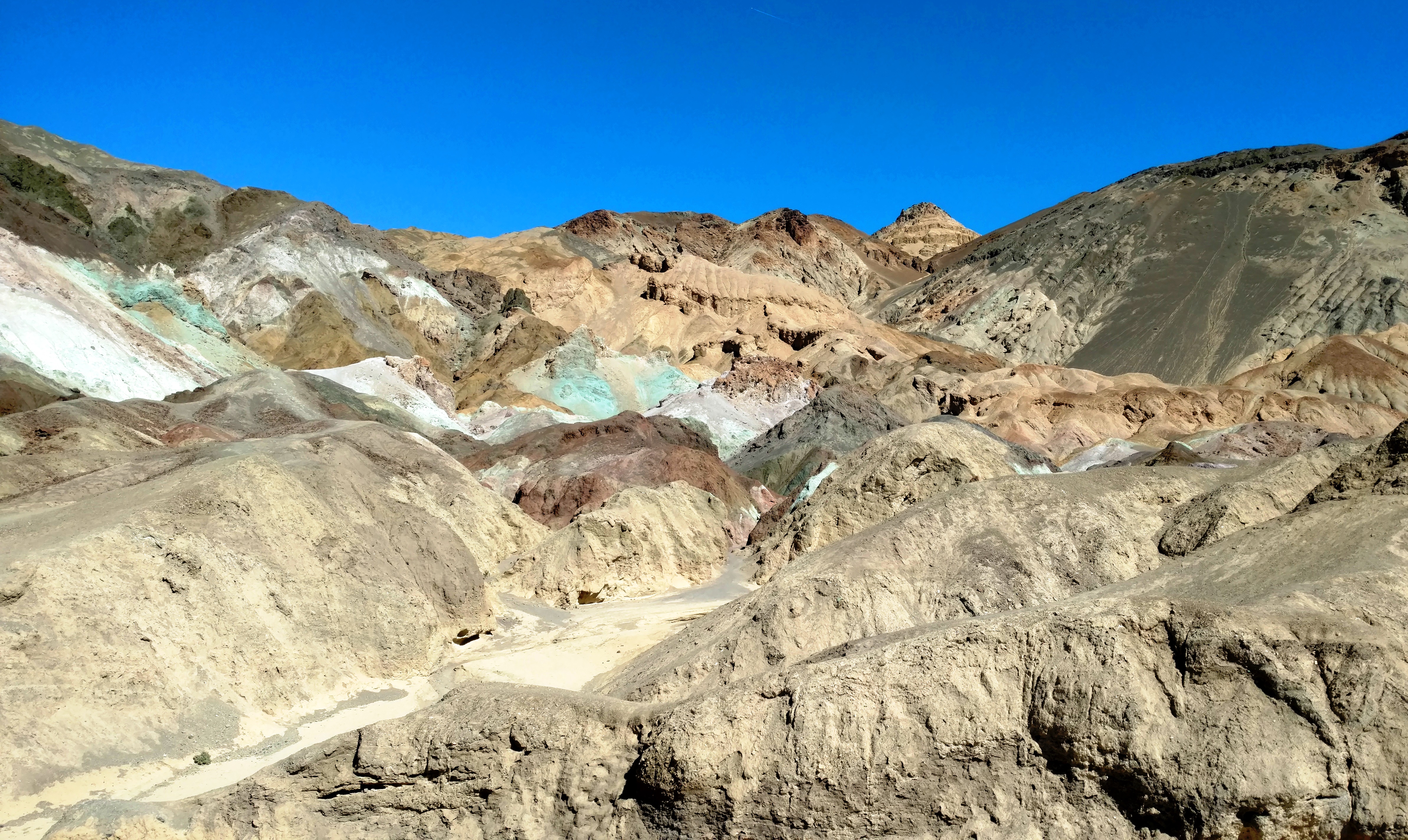 View along Zabriskie Point trail (L.Compisi)
View along Zabriskie Point trail (L.Compisi)
Although we had considered driving from our Sonoma County home base the daunting 10+ hour drive motivated us to fly into Las Vegas instead and use the City of Pahrump Nevada as our base of operations. That proved to be a great call. Upon landing at McCarran International Airport, we picked up a rental car and drove the 63 miles to Pahrump in about an hour. Very little traffic and some amazing mountain and desert views along the way.
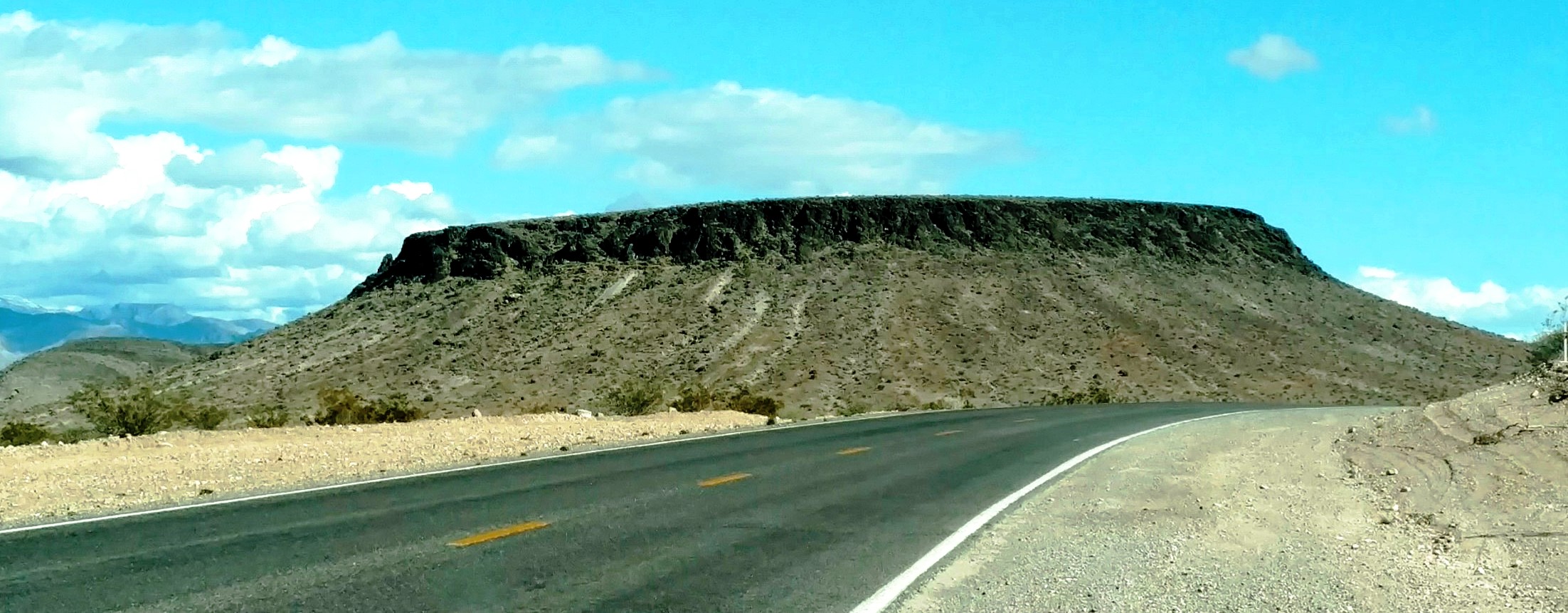 Butte along Scenic CA 190 (L.Compisi)
Butte along Scenic CA 190 (L.Compisi)
Activities and adventures:
We had two objectives for our visit: to hike as much as possible and to see as much of the stark and awe-inspiring terrain and vistas as we could. Each morning after a quick breakfast at our hotel, we drove the easy 50 miles to Scenic Highway (CA 190) entrance to the Park. Although the route from Pahrump (Nevada Highway 160) to the Park is mostly 2 lanes, there are enough straight sections to allow for passing of slower vehicles. We did not have any issues with traffic and, again, the scenery was so different and beautiful that the time seemed to melt away like we were in a time warp.
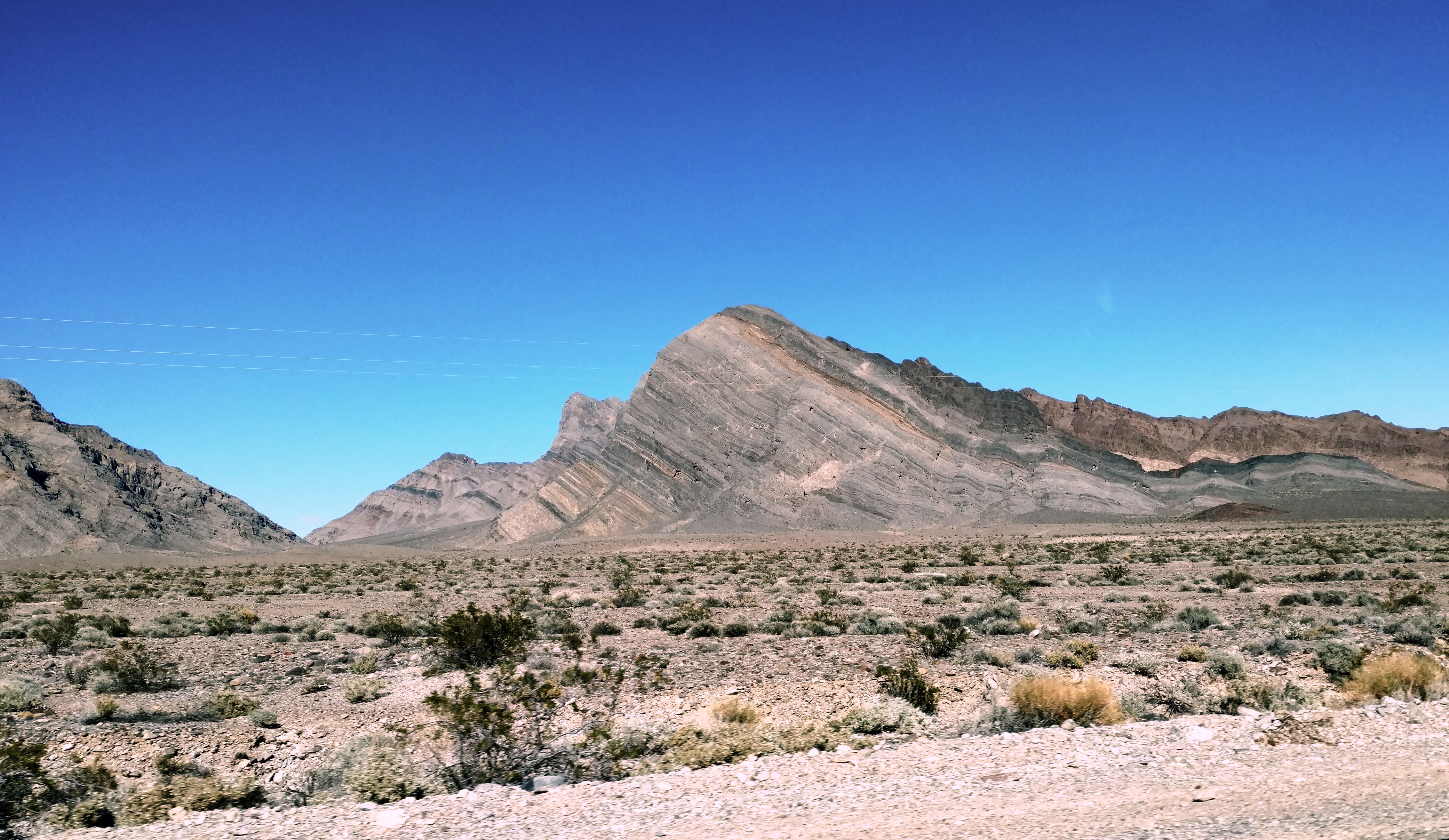 More views along CA 190 (L.Compisi)
More views along CA 190 (L.Compisi)
The Park has a couple of Visitor Information Centers and the Stovepipe Wells Village for food, fuel and other human needs. This is a National Park. Entrance fees per vehicle are $25. Per person is $12. Motorcycle fees are $10 for one person or $20 for two people to a flat rate of $20. Death Valley Annual Pass is $50. Fees for most campsites in the park are $4 per night. Four campgrounds in the park continue to be free: Emigrant, Wildrose, Thorndike, and Mahogany. Of course, U.S. citizens or permanent residents aged 62 or older can get lifetime Senior Passes for $80.
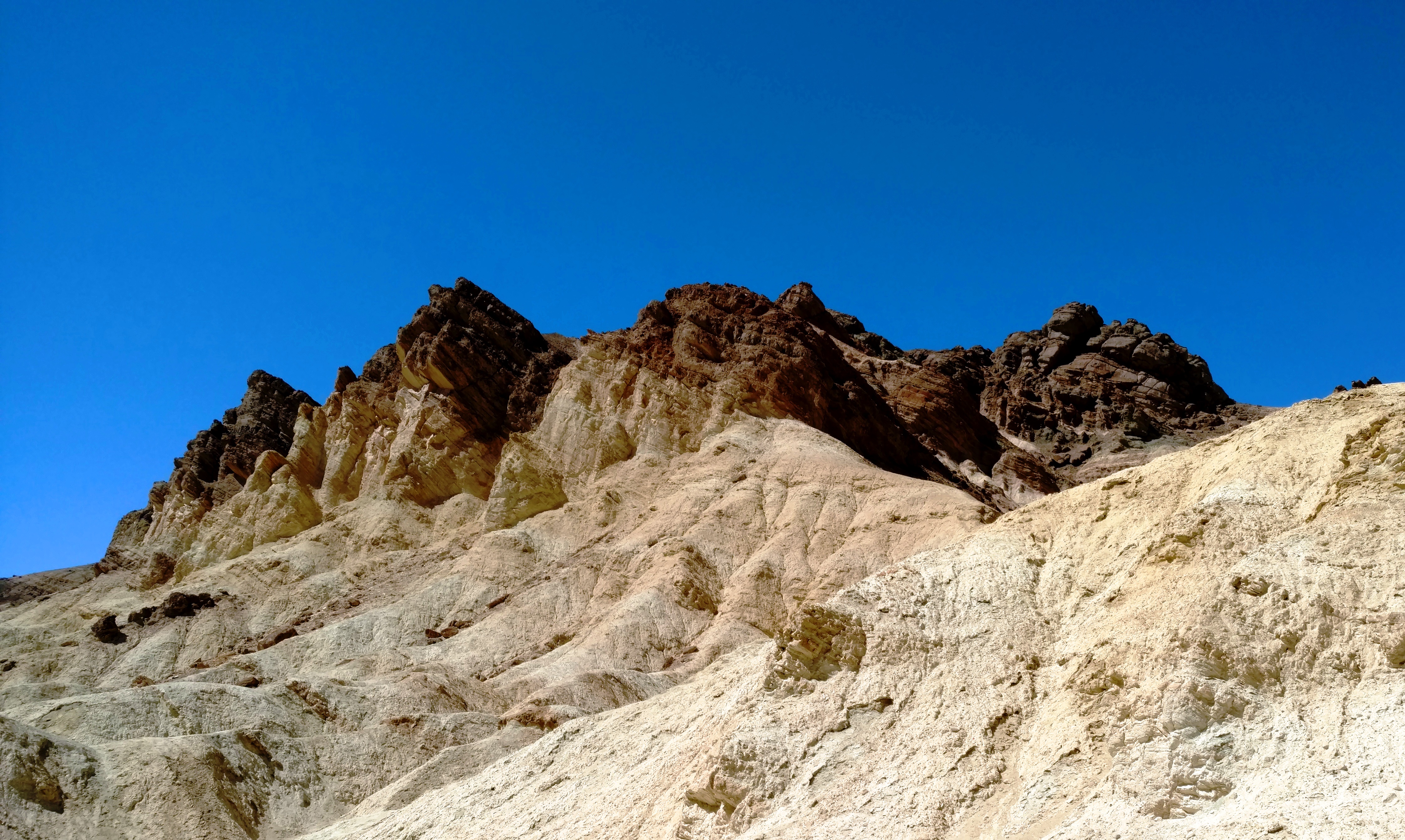 Crazy formations and colors (L.Compisi)
Crazy formations and colors (L.Compisi)
Golden Canyon Trail is an easy, slightly upward, trail that starts just a couple miles away from the Furnace Creek Visitors and Information Center which, in turn is 60 miles from Pahrump. This visitor center has a small refrigerated section with premade sandwiches and drinks as well as a gift shop. It also is a Park Service Ranger Station for information, assistance and fee collection. The trail head has a parking lot and restrooms. No water is available so bring at least a bottle per person for this 2-mile round trip hike. Add an additional 1 mile and you can get fairly close to the Red Cathedral, a massive rock formation which has features resembling a gothic cathedral.
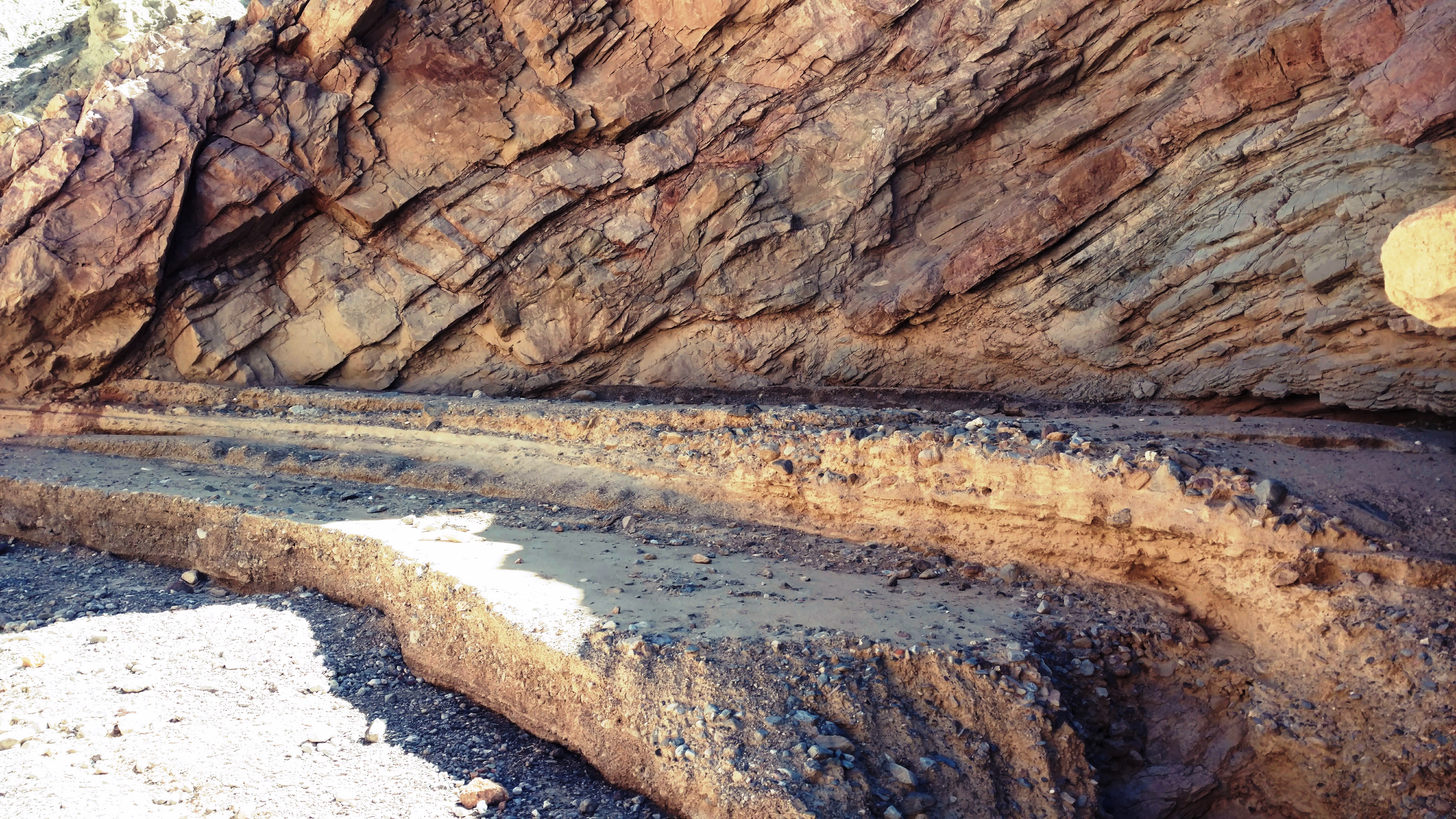 Amazing colorful layers and formations (L.Compisi)
Amazing colorful layers and formations (L.Compisi)
 View of Red Cathedral at the end of Golden Canyon Trail (L.Compisi)
View of Red Cathedral at the end of Golden Canyon Trail (L.Compisi)
On our second day we decided to combine short hikes and a dazzling scenic drive. We drove to the Natural Bridge trail head which sported the typical restrooms and again, no water. This is an easy .3-mile one way walk. It is gradually uphill on the way out. The trail is a narrow canyon and once you reach the 50-foot tall bridge you can continue for another .5 miles to the end past a couple of obstacles requiring scrunching down around a large boulder or scrambling up a dry water falls until you reach a 20’ high dry waterfalls that requires special gear to scale. Once we finished this easy hike we decided to drive the one-way Artists Drive. We were very happy we did.
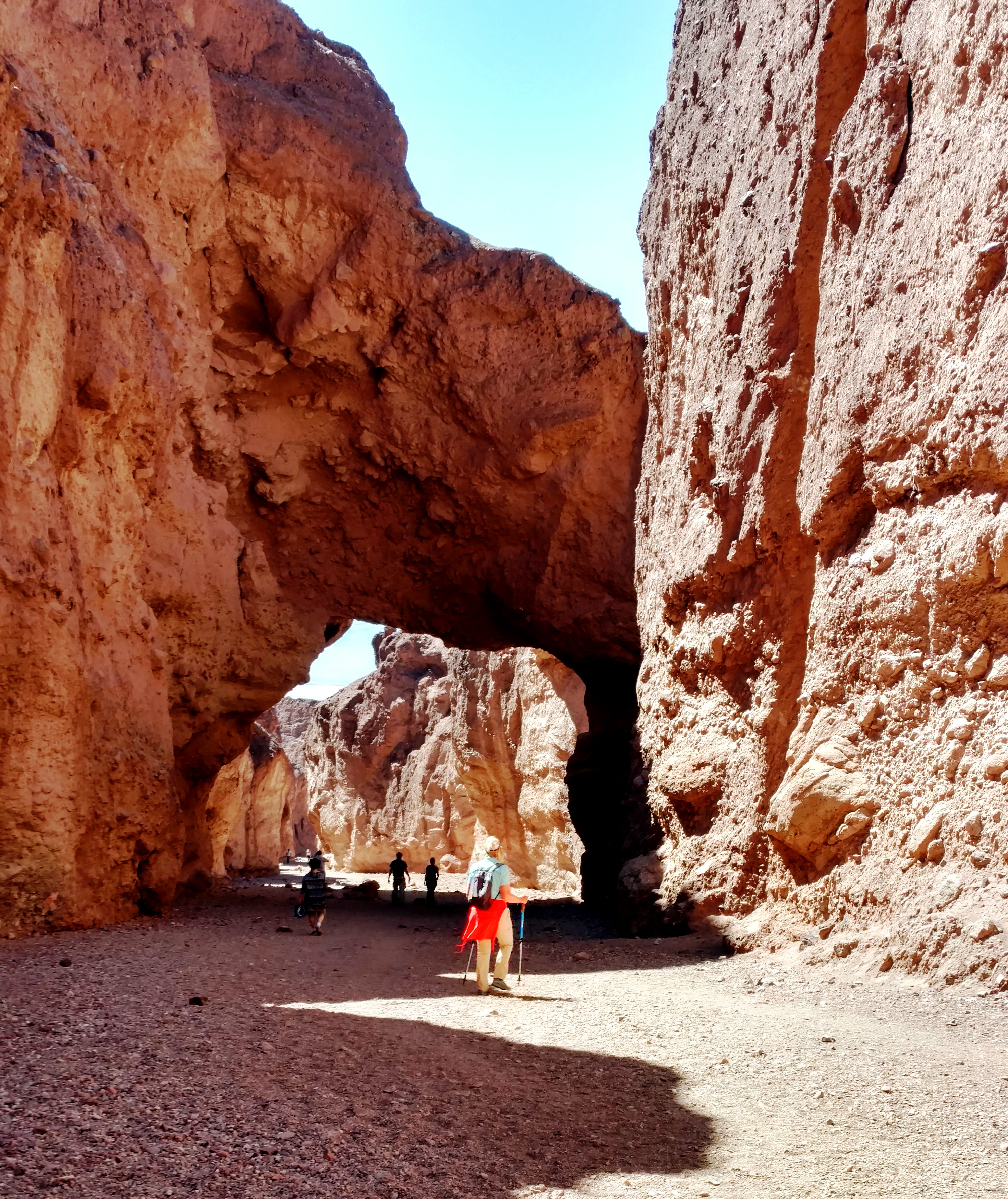 50′ high Natural Bridge (J.Compisi)
50′ high Natural Bridge (J.Compisi)
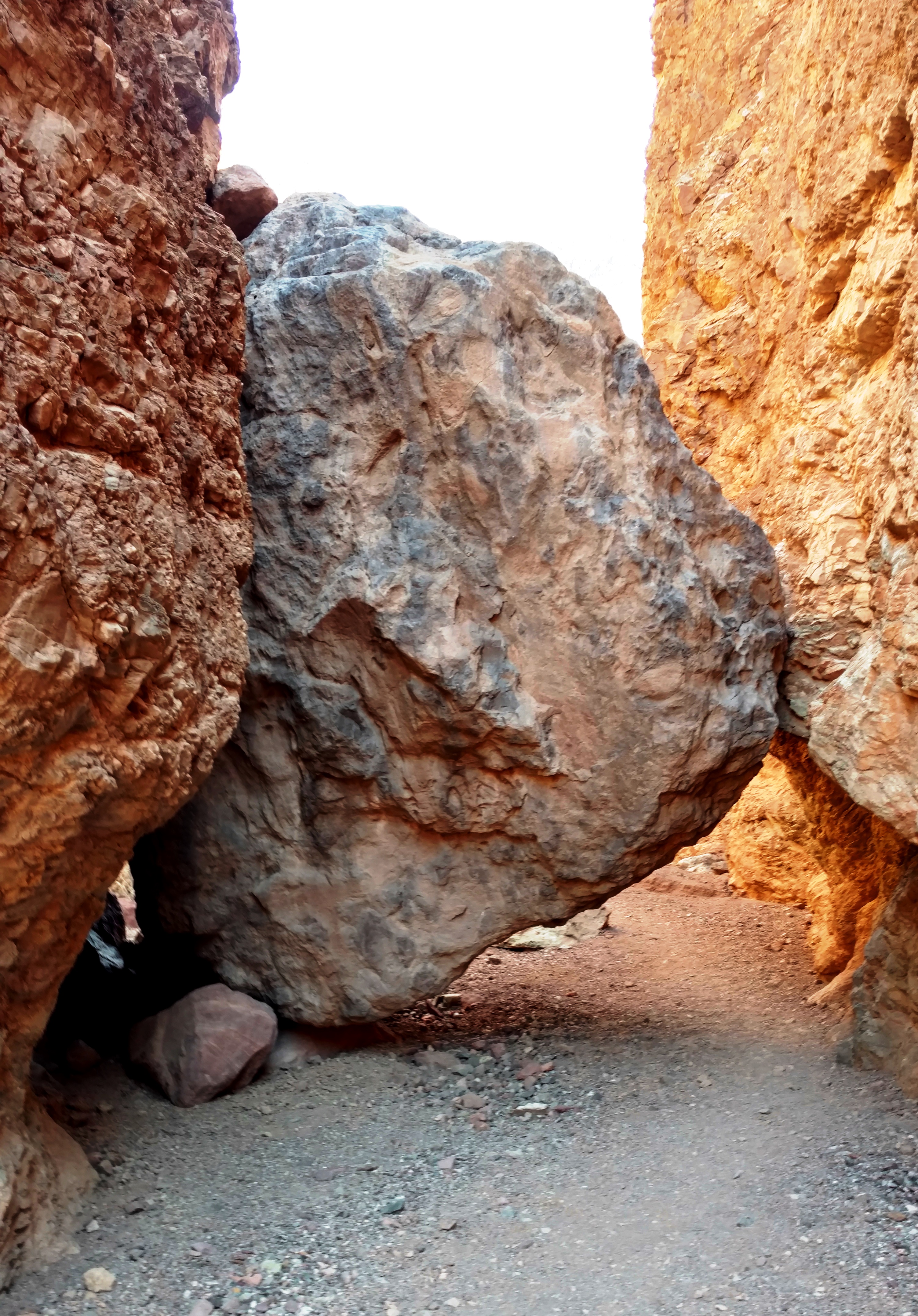 Boulder obstacle after Natural Bridge (J.Compisi)
Boulder obstacle after Natural Bridge (J.Compisi)
The entrance to the one-way Artist’s Drive is located off Badwater Road about 10 miles South of Furnace Creek Visitor’s Center. The start of the drive is clearly marked. It will take you about 45 minutes to complete the drive (assuming little traffic or slow-moving vehicles). Early on the drive you’ll reach a parking and view area. The .5-mile uphill walk to the view point is worth every step. Driving on through numerous roller coaster type dips you’ll arrive at Artist Palette, about 5 miles from the start. There are restrooms here and it is worth taking a few minutes to walk through the amazing washes and canyons here. So different from what you may have already seen.
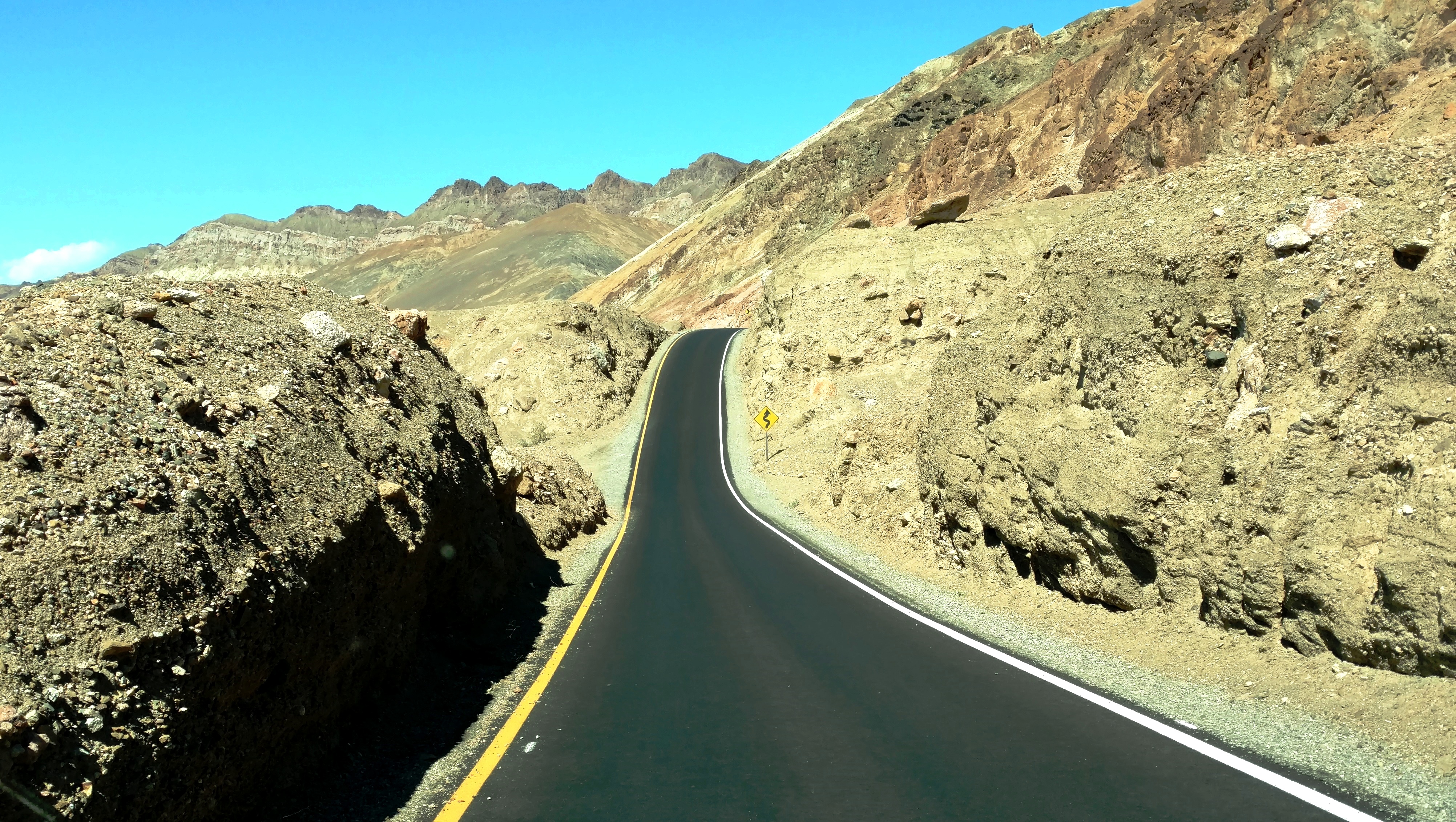 9 mile Artists Drive offers dips and colorful surroundings (L.Compisi)
9 mile Artists Drive offers dips and colorful surroundings (L.Compisi)
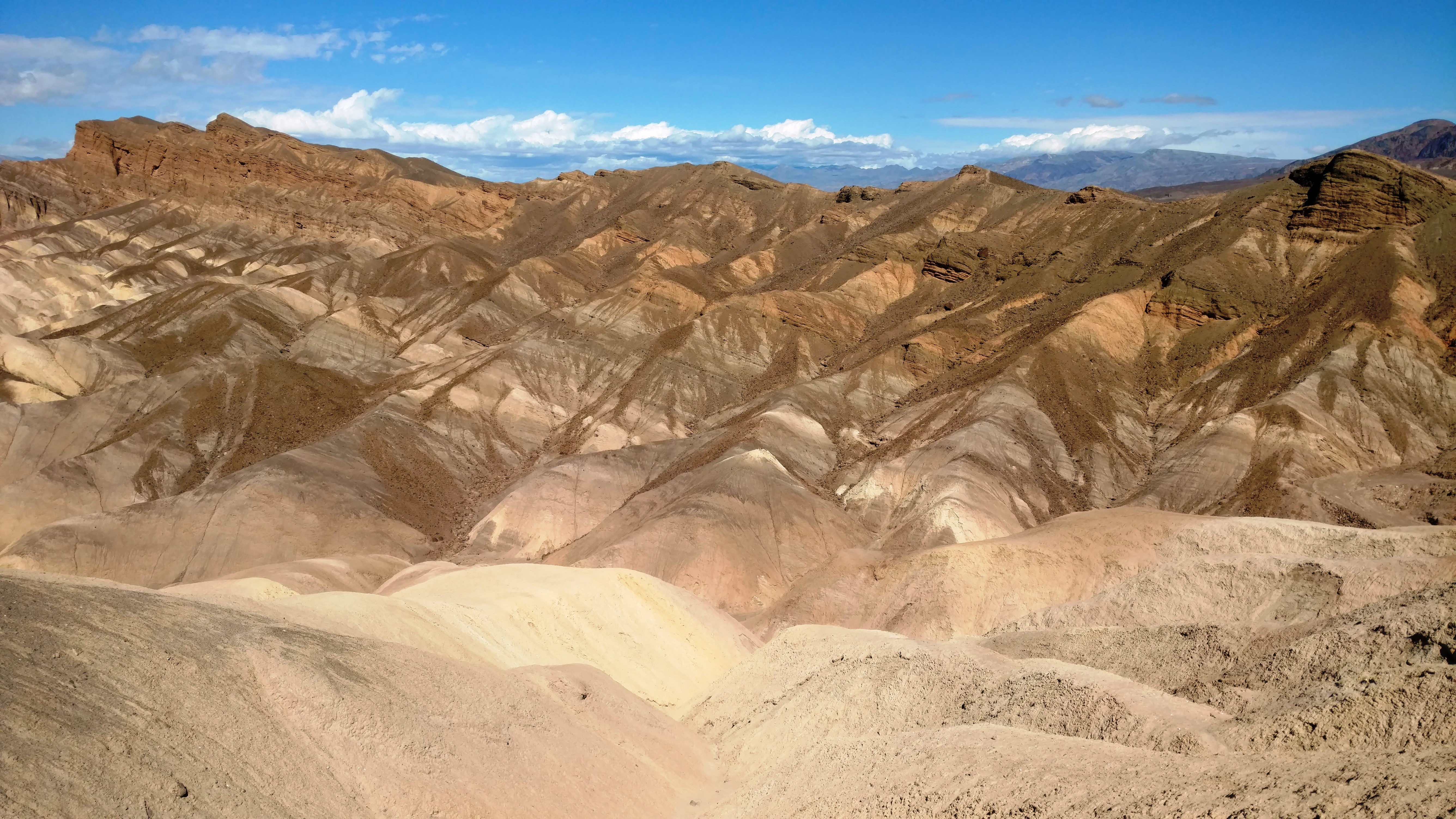 Indescribable formations of eroded rock (L.Compisi)
Indescribable formations of eroded rock (L.Compisi)
After leaving the Artists Drive, we drove about 23 miles past the Furnace Creek Visitor’s Center to the Mesquite Flat Sand Dunes. All day (and the day before) we had seen this area north and east in the distance which appeared to be clouds and rain. We realized when we approached that we were wrong. These large sand dunes were whipped by the wind creating the ‘clouds’ we had seen. This ‘sandstorm’ was exaggerated by the people walking on the dunes causing additional sand to be picked up into the air. Again, worth the time to visit and take a walk on the sandy-side!
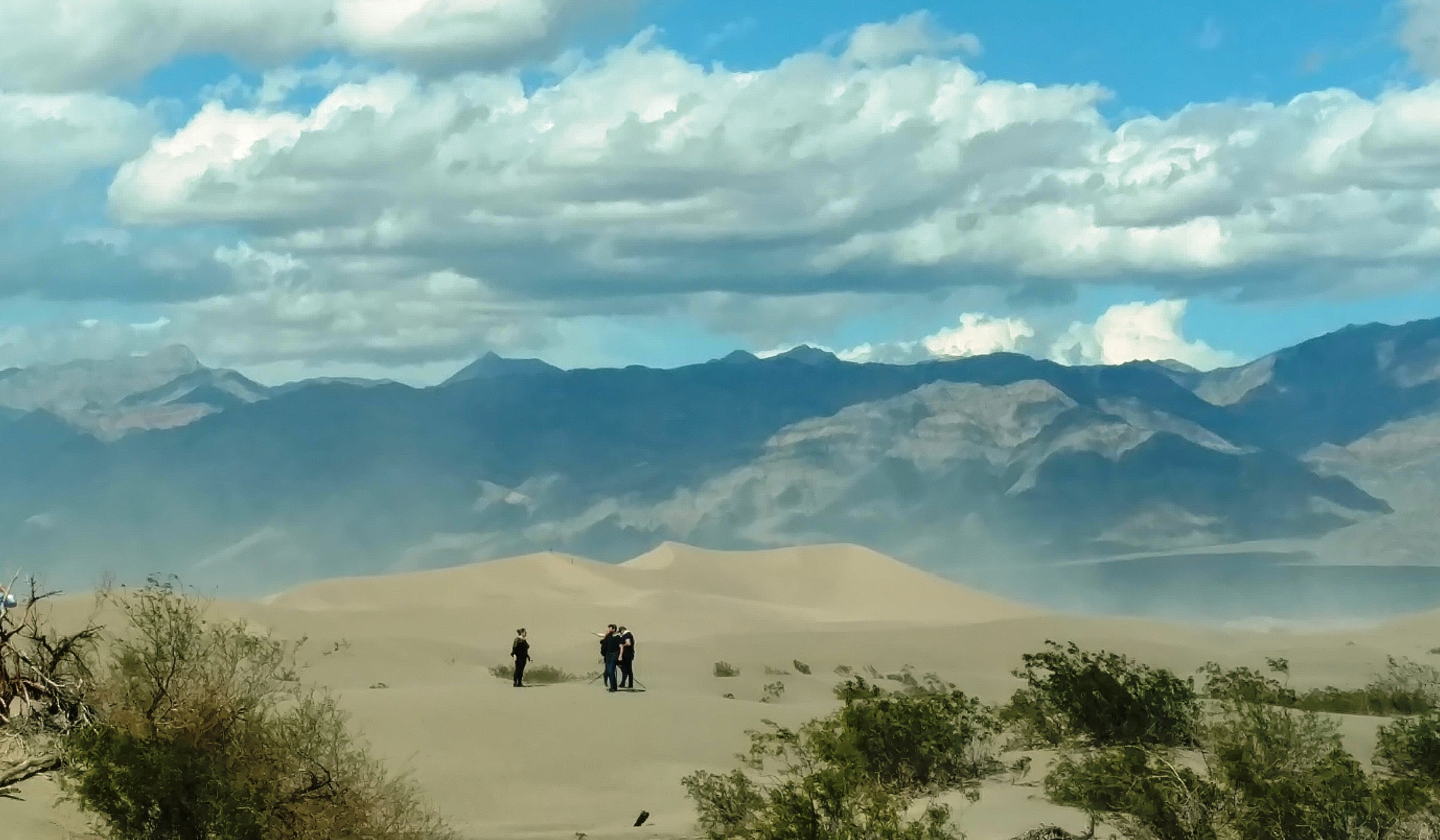 Wind blows the sands at Mesquite Flat (L.Compisi)
Wind blows the sands at Mesquite Flat (L.Compisi)
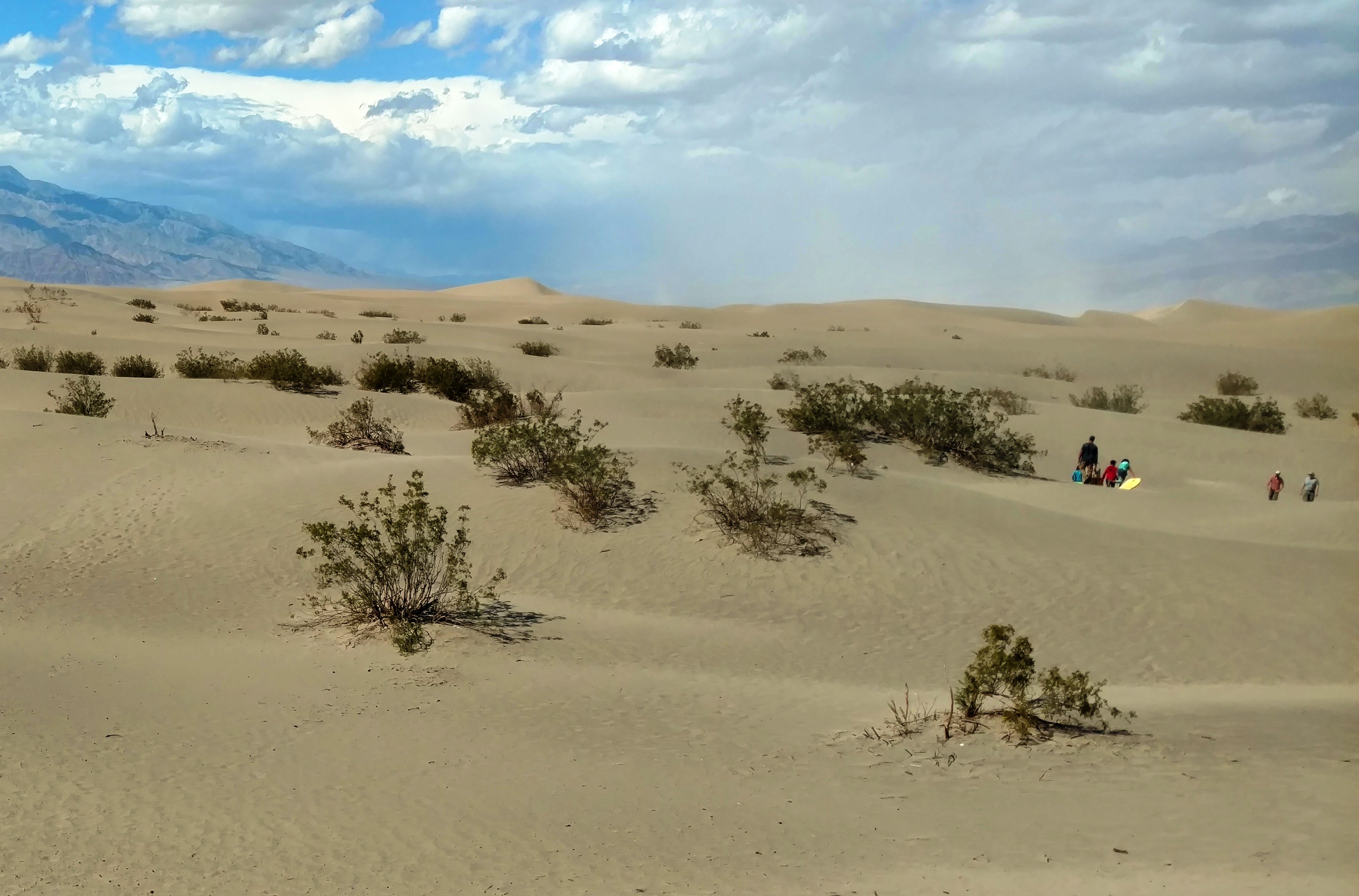 People Surfing the Mesquite Flat Sand Dunes (L.Compisi)
People Surfing the Mesquite Flat Sand Dunes (L.Compisi)
Zabriskie Point, named after Christian Brevoort Zabriskie, who was vice-president and general manager of the Pacific Coast Borax Company in the early 20th century and made more famous through the 1970 film. The Pacific Coast Borax Company mined and transported Borax in Death Valley. The effects of wind and water erosion in this area are mindboggling! The View Point is a thrill with broad vistas of color filled windswept rocks and folds. Indescribable!! The Zabriskie Point trail head offers a few options including a 7-mile loop via Gower Gulch, Golden Canyon, Badlands Loop and back to Zabriskie Point. This trail offers such a variety of geological up thrusts, colors, washes, and heart stopping drop-offs that we actually thought about turning back at one point. Proceeding forward was the well rewarded decision. It is about 55 miles from Pahrump to the Zabriskie Point parking lot. The parking lot offers well maintained rest rooms which always come in handy.
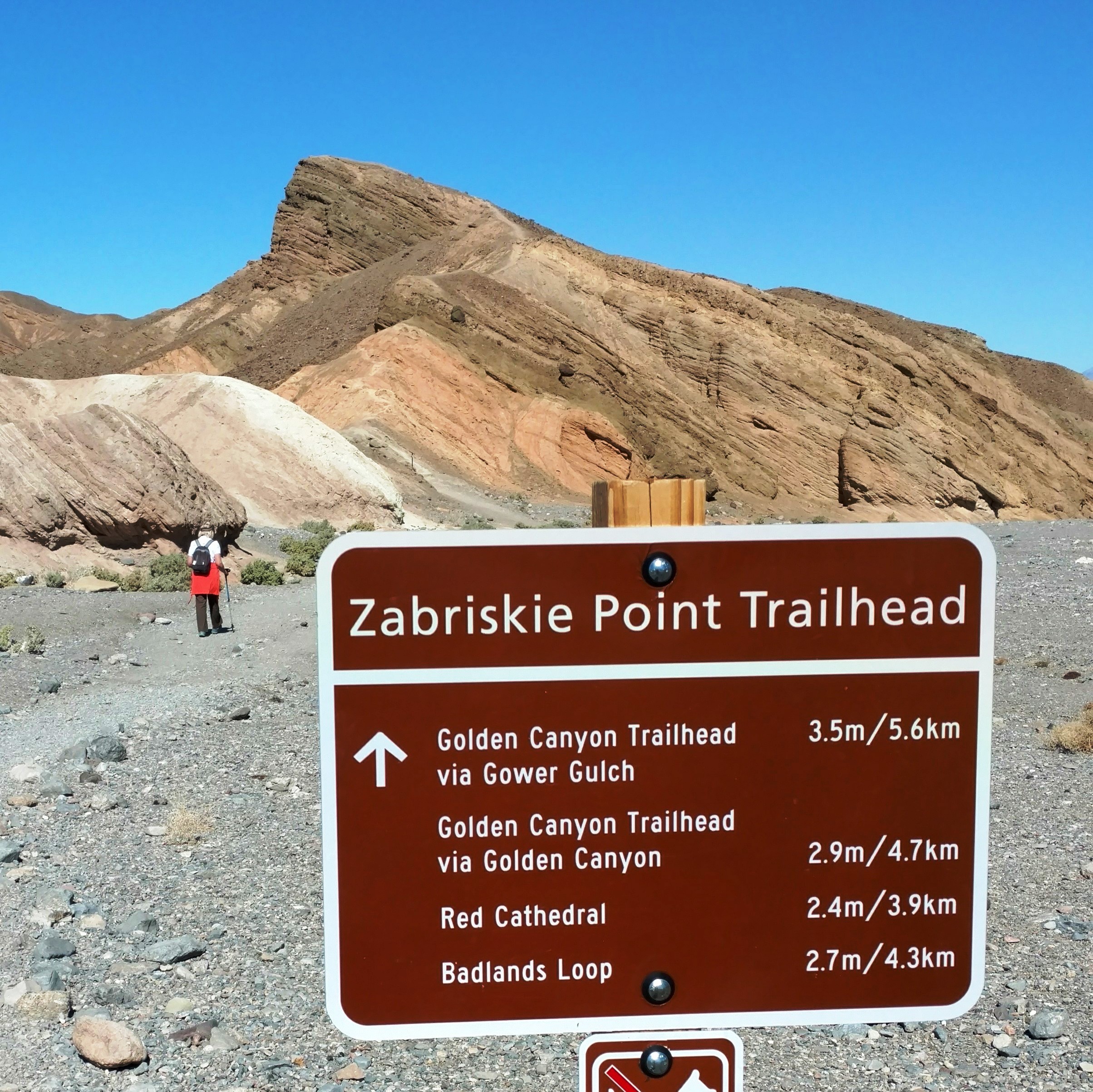 Zabriskie Point Trail Head (J.Compisi)
Zabriskie Point Trail Head (J.Compisi)
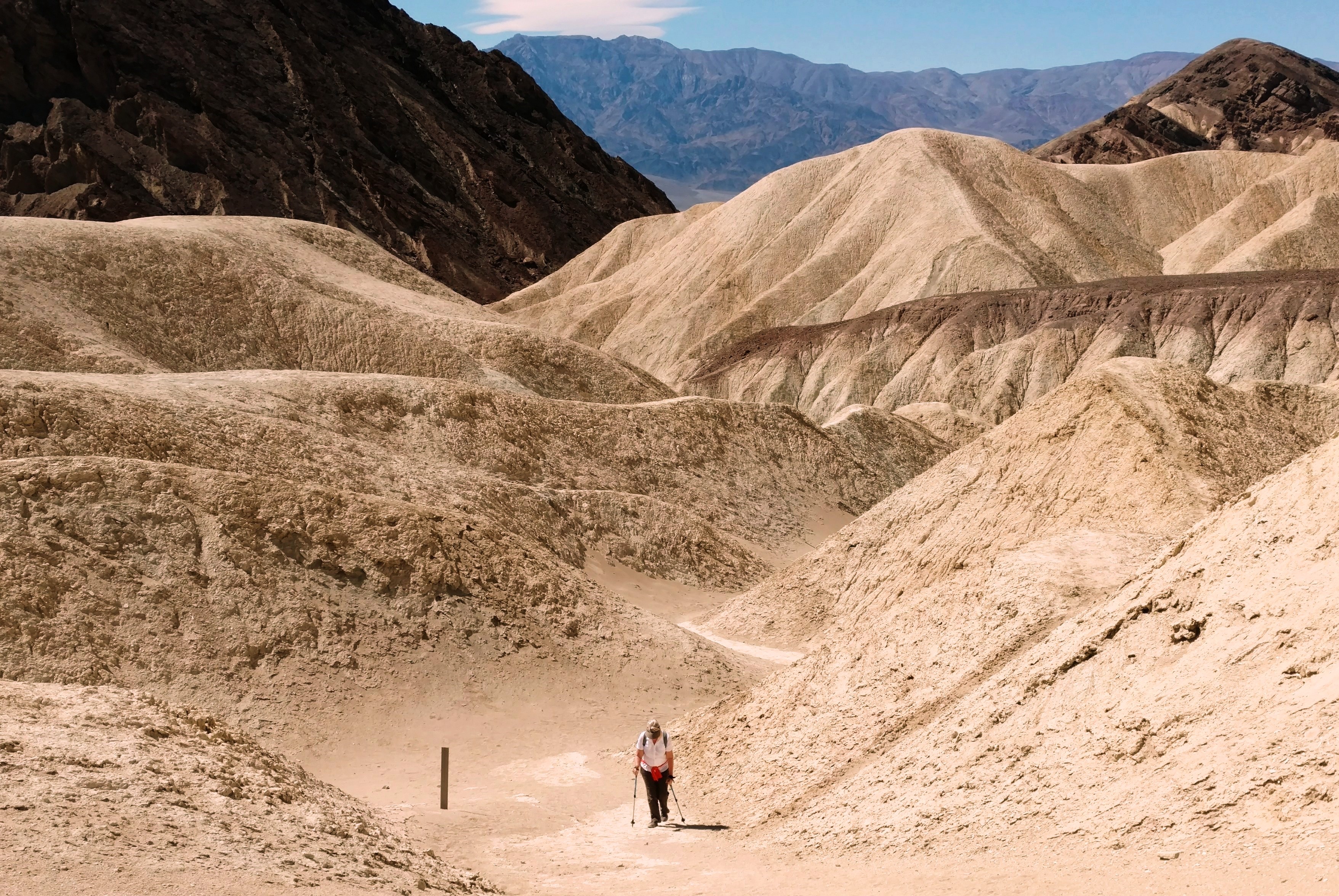 Badlands Loop returning to Zabriskie Point (J.Compisi)
Badlands Loop returning to Zabriskie Point (J.Compisi)
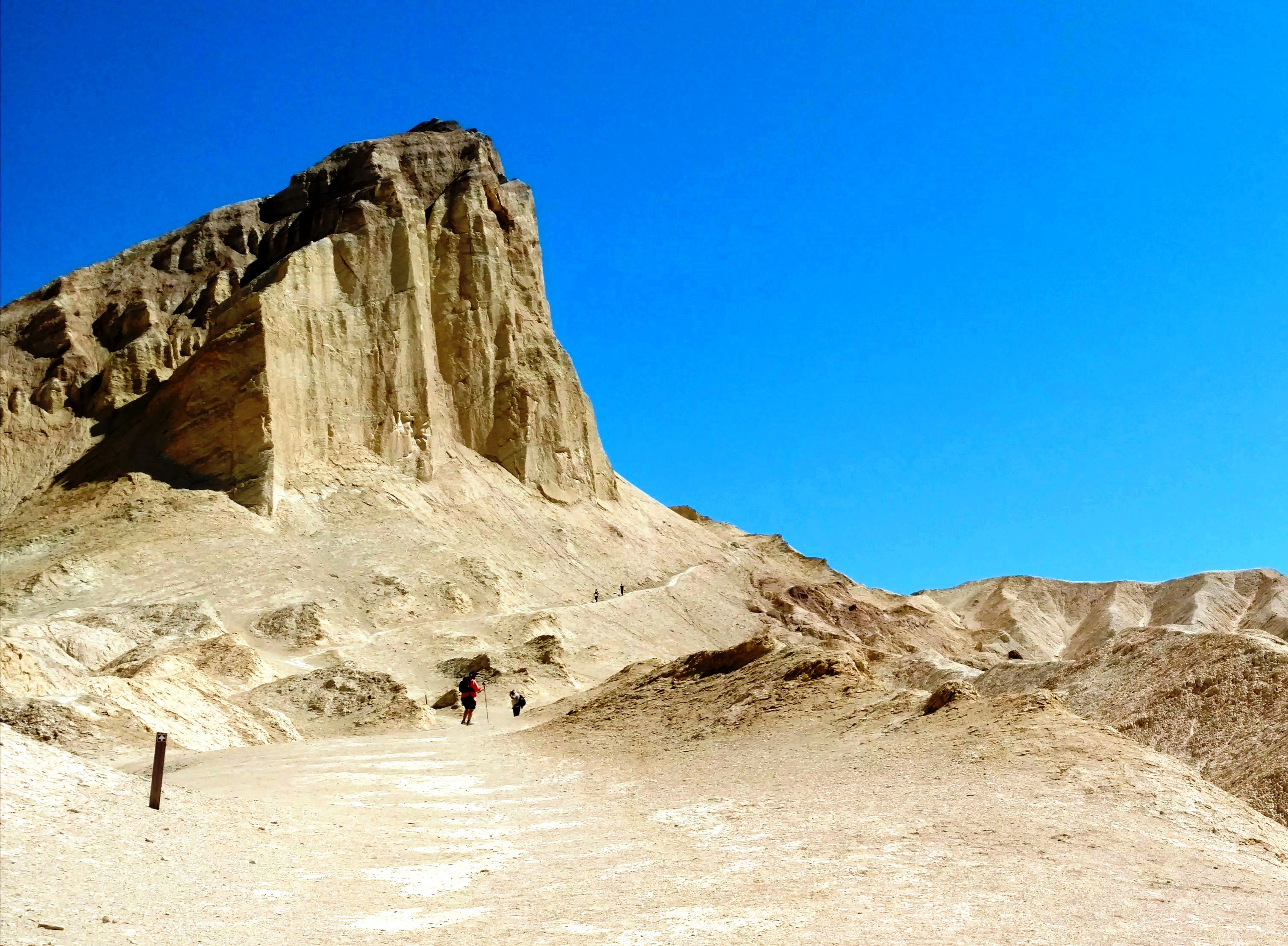 Leaving Golden Canyon toward Badlands Loop (L.Compisi)
Leaving Golden Canyon toward Badlands Loop (L.Compisi)
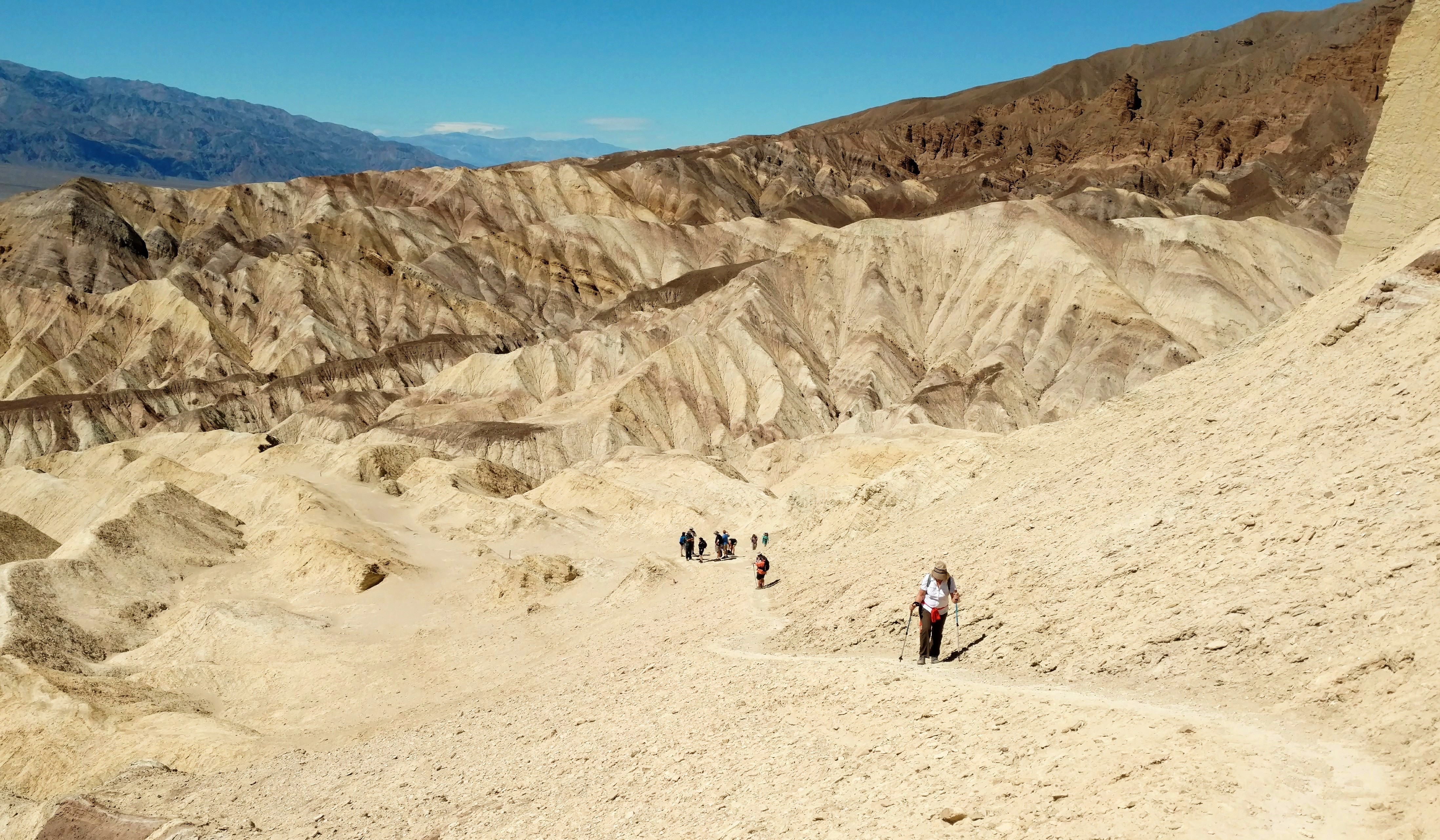 Looking back toward Golden Canyon (J.Compisi)
Looking back toward Golden Canyon (J.Compisi)
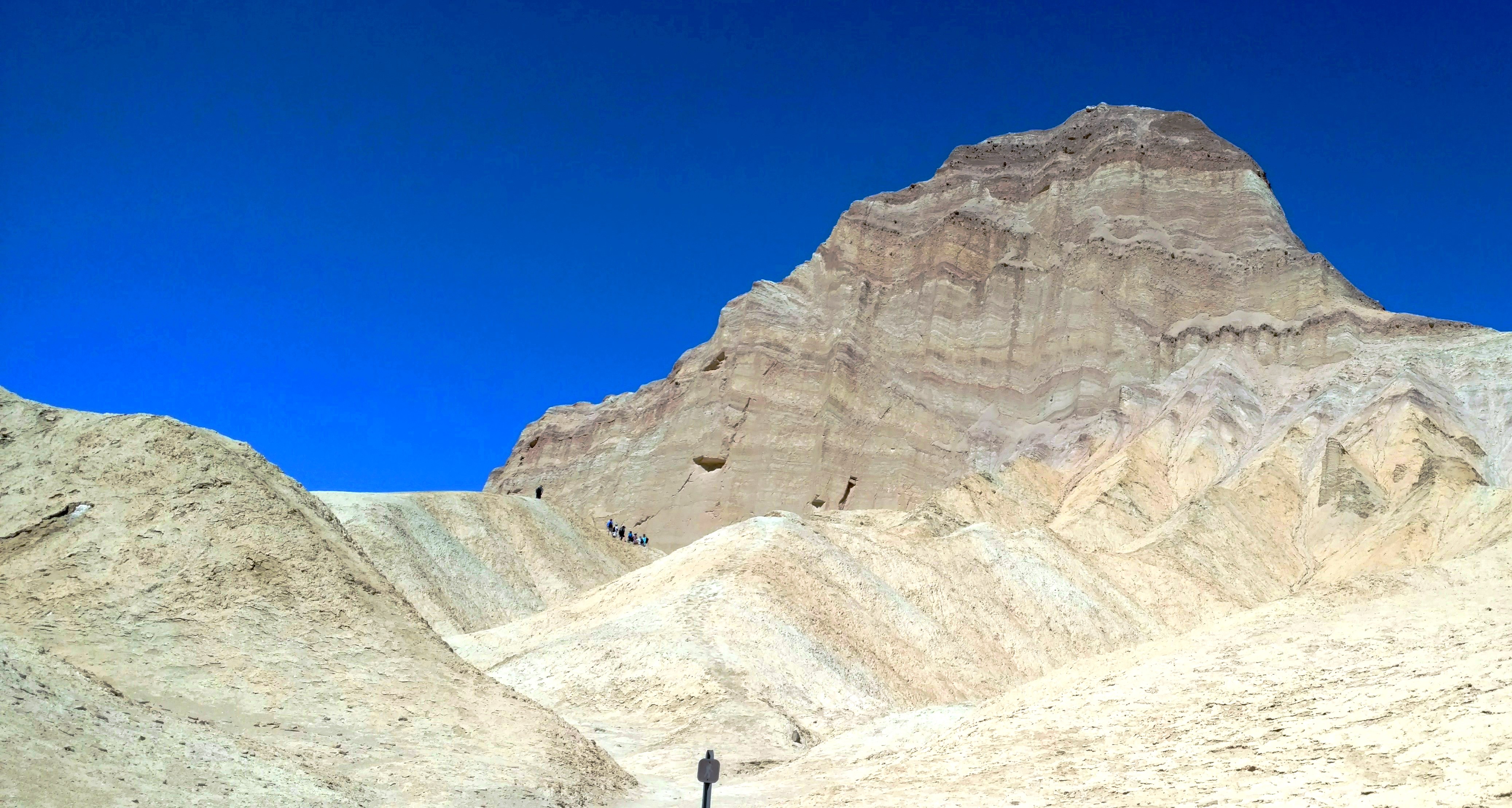 Near bottom of Badlands Loop (L.Compisi)
Near bottom of Badlands Loop (L.Compisi)
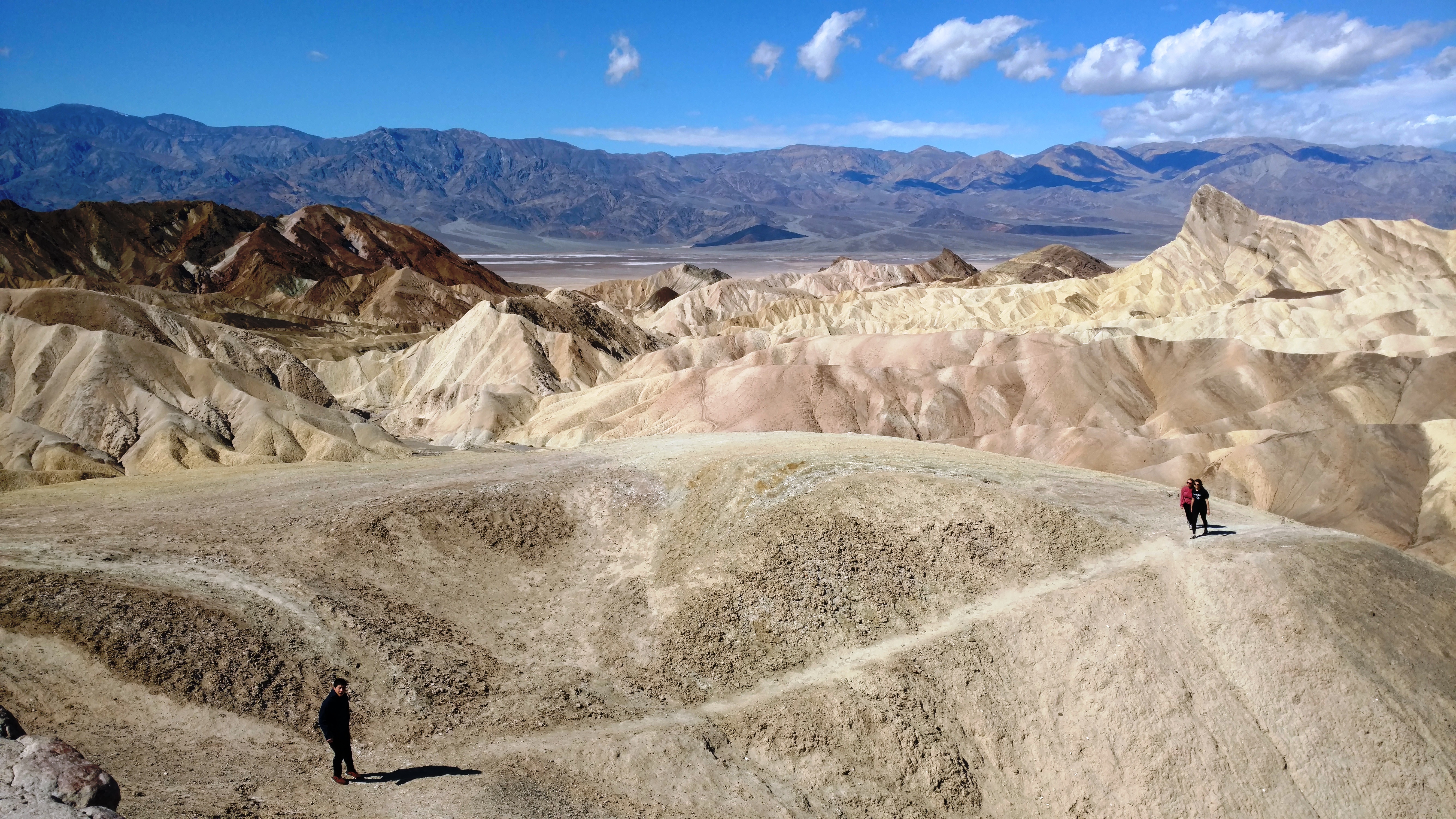 View from Zabriskie Point scenic look out (L.Compisi)
View from Zabriskie Point scenic look out (L.Compisi)
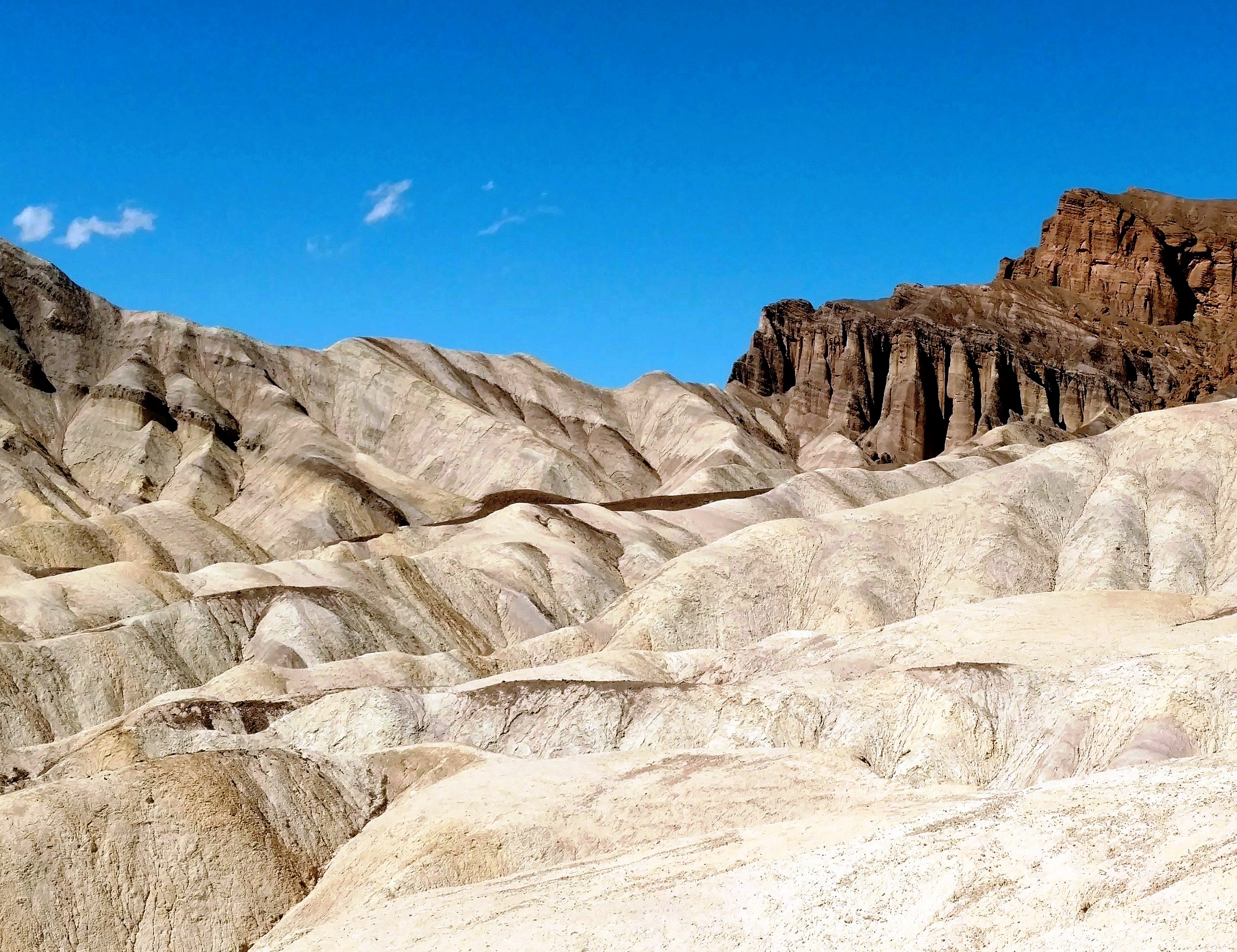 Amazing erosion folds from Zabriskie Point (L.Compisi)
Amazing erosion folds from Zabriskie Point (L.Compisi)
Where to stay:
We stayed at the Holiday Inn Express & Suites Pahrump and were very impressed. The hotel is fairly new, about 3 years old), very clean, well-managed with noteworthy service by an exceptionally friendly and helpful staff. The Holiday Inn has a very well-equipped fitness facility and an inviting outdoor swimming pool with hot tub. With rates starting at $143 including free parking, internet and complimentary breakfast (very good coffee and a variety of breakfast options) this was a perfect choice for us.
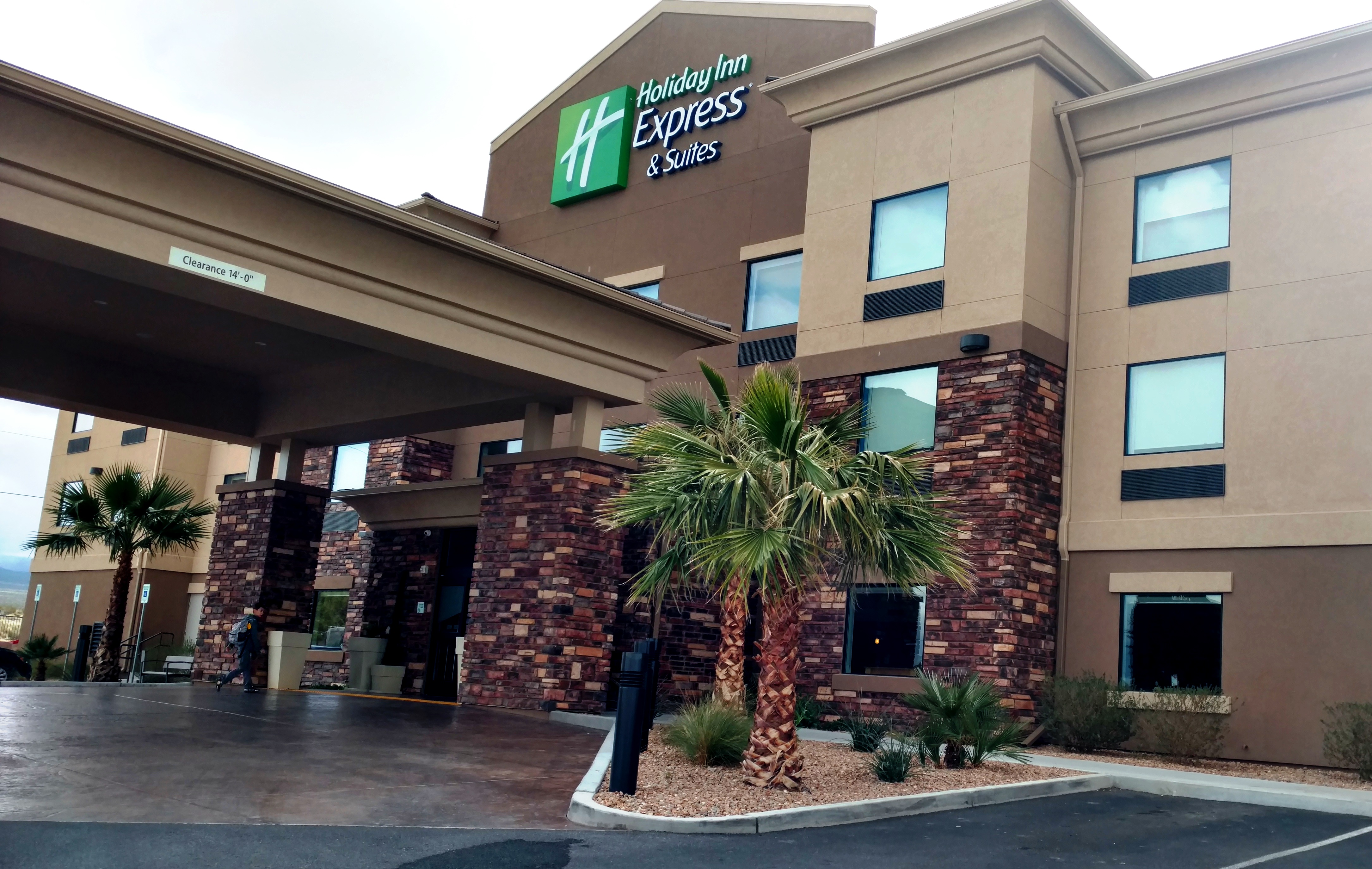 Holiday Inn Express & Suites Pahrump (L.Compisi)
Holiday Inn Express & Suites Pahrump (L.Compisi)
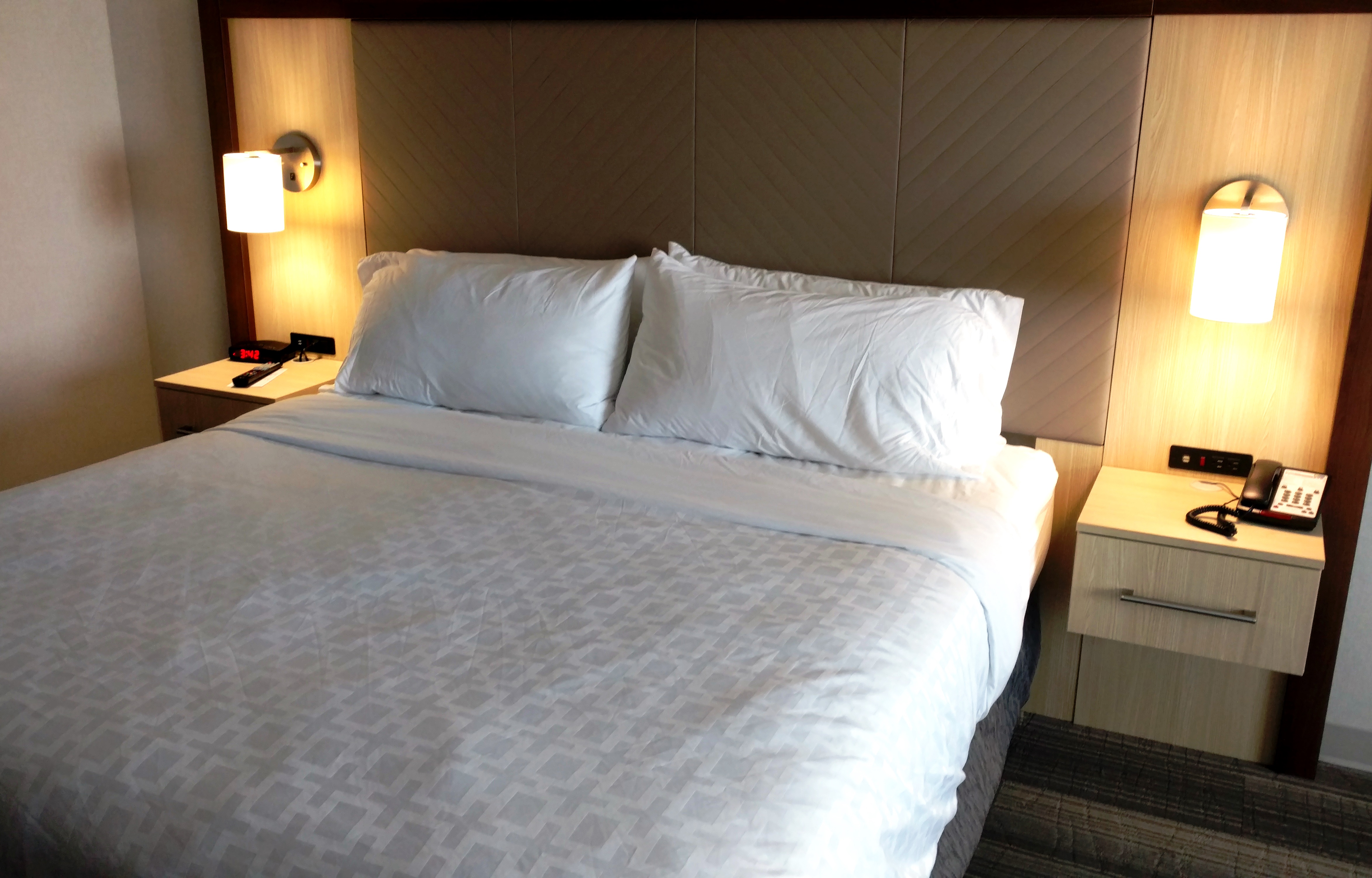 Clean fresh rooms and comfortable beds (L.Compisi)
Clean fresh rooms and comfortable beds (L.Compisi)
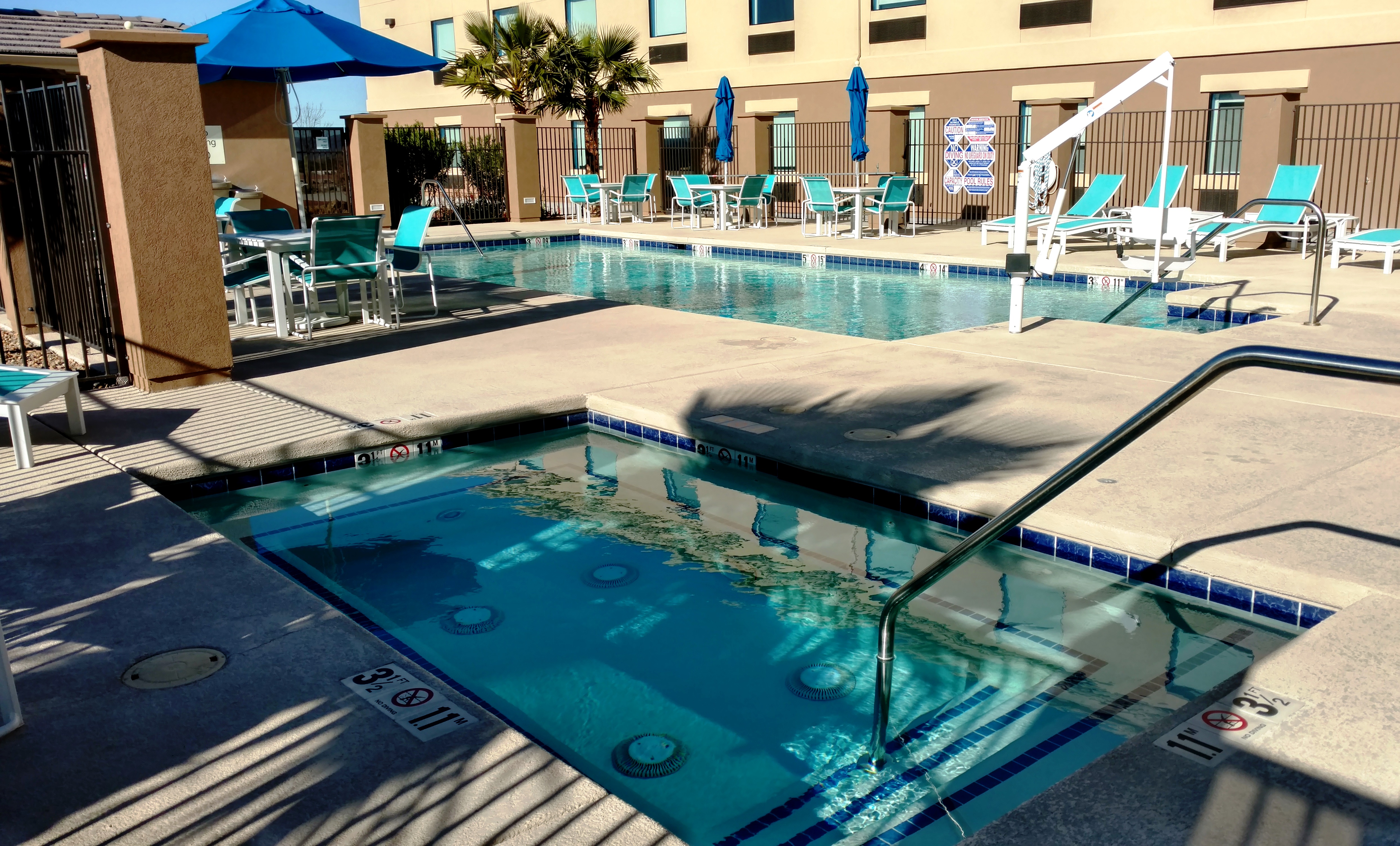 Beautiful pool and hot tub at HI Express (L.Compisi)
Beautiful pool and hot tub at HI Express (L.Compisi)
There are other places to stay within Death Valley National Park but the rates were very high at the resorts and the availability was extremely limited in the hotels/motels in the vicinity with more reasonable rates.
Where to dine:
We had breakfast everyday at the out hotel (see above) and grabbed lunch at one of the visitor centers. Dinner offered 4 opportunities to experience the local fair in Pahrump. We enjoyed the Thai food at Chat Thai Bistro on one night and found Mom’s Diner to be unique, fresh and well prepared. Ultimately, however, our favorite dining spot in Pahrump was Symphony’s Restaurant and the integral Pahrump Valley Winery. First, finding an operating winery in Nevada was a bit of a surprise. The winery has multiple labels including Nevada Ridge whose wines are all made from either Estate grapes or grapes from small local Nevada growers. Additionally, the Charleston Peak label sources grapes from nearby California vineyards on the western slopes of Mount Charleston along the CA/NV border. Finally, the Pahrump Valley Winery label which maintains the legacy California sourced wines of Symphony (a unique cross of Grenache Gris and Muscat of Alexandria created at UC Davis), Desert Blush and others. The wine is only part of the story and quite worthwhile on its own, but Symphony’s Restaurant was like discovering the mother lode. Owners Bill and Gretchen (also the winemaker) Loken have given Executive Chef David Hutchinson a free hand. Great move. Using fresh sourced produce and wonderful meats and seafood, the dishes coming out of the kitchen are flavorful, delightful to the eye and plain delicious.
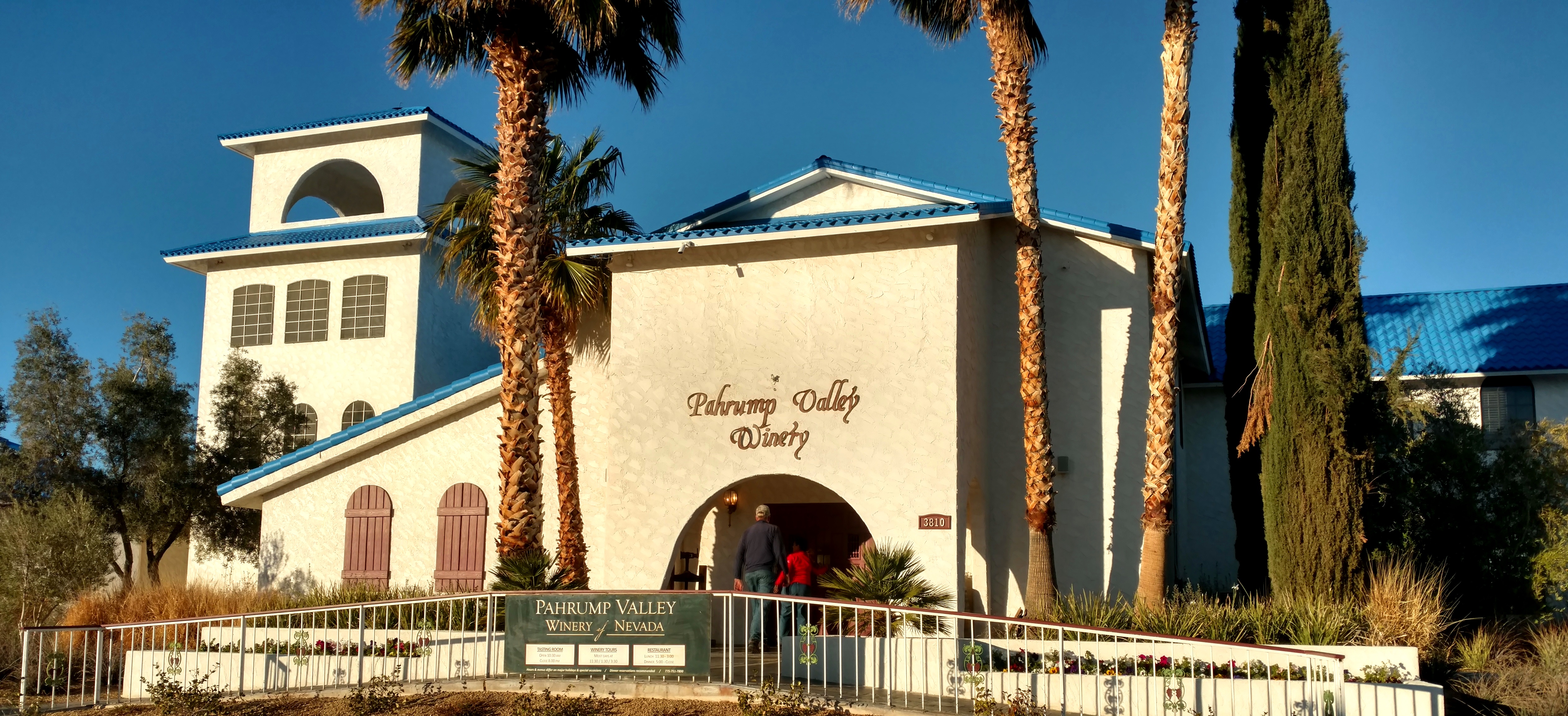 Pahrump Valley Winery and Symphony Restaurant (L.Compisi)
Pahrump Valley Winery and Symphony Restaurant (L.Compisi)
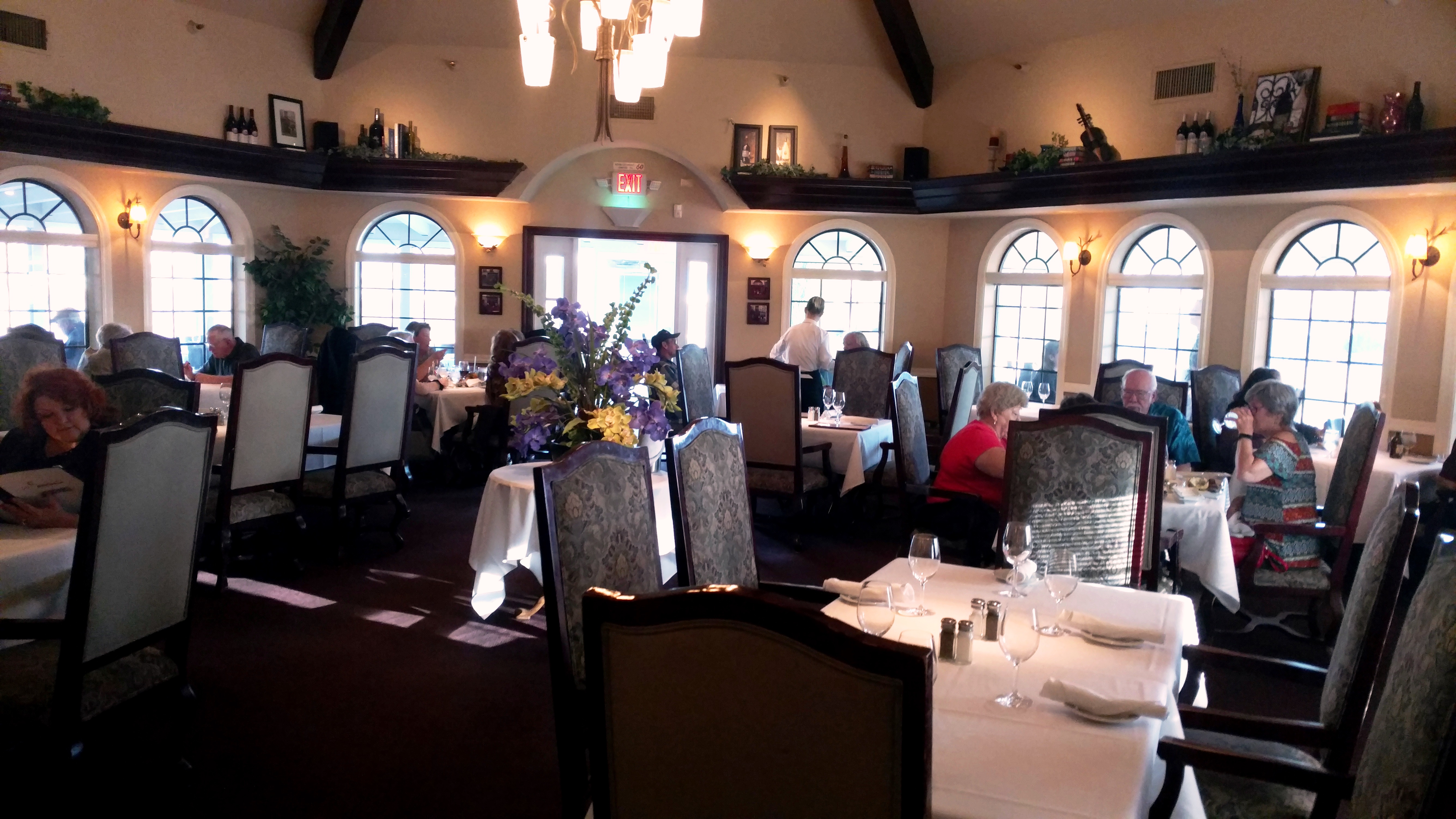 Main Dining Room at Symphony (L.Compisi)
Main Dining Room at Symphony (L.Compisi)
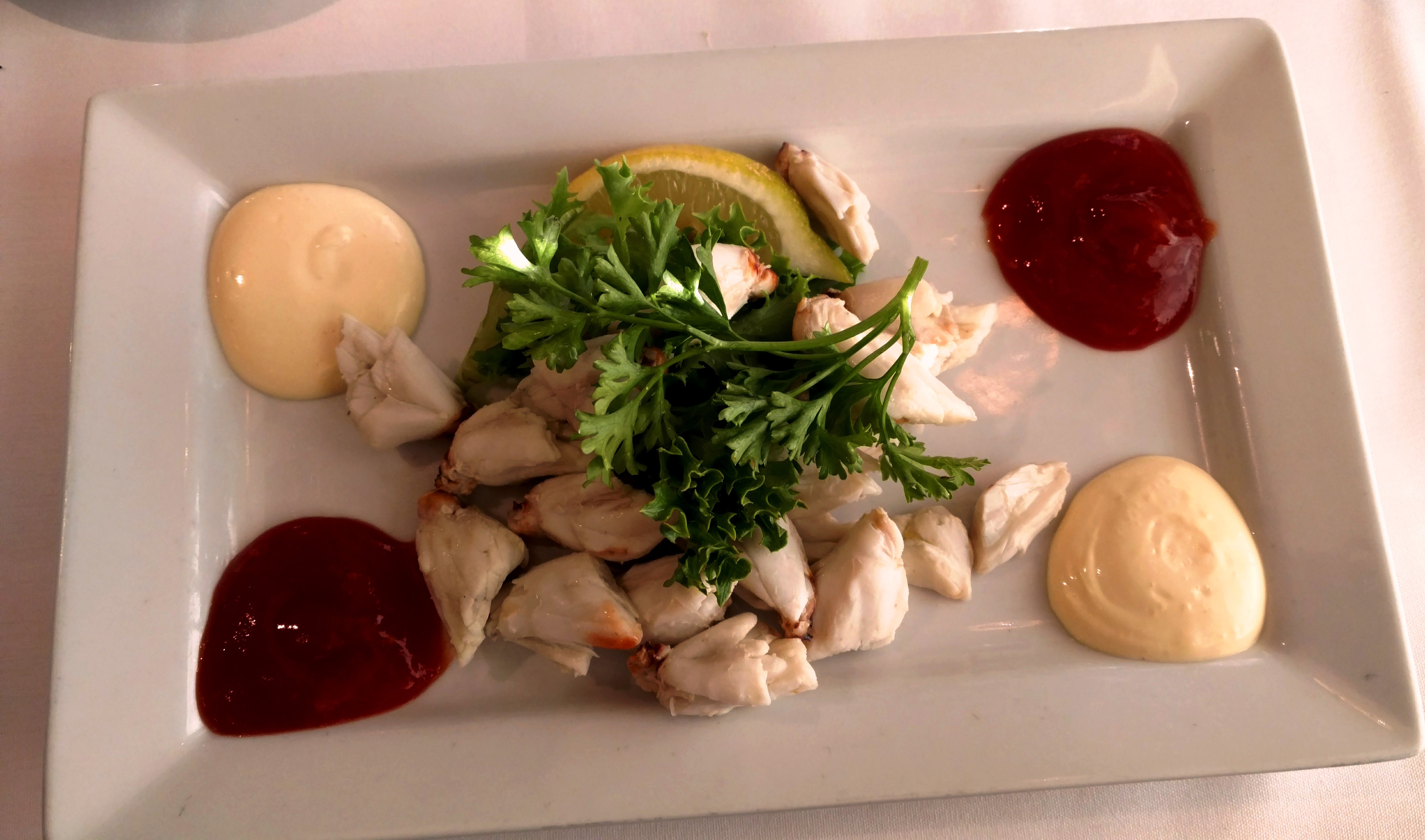 Chunked Dungeness Crab (L.Compisi)
Chunked Dungeness Crab (L.Compisi)
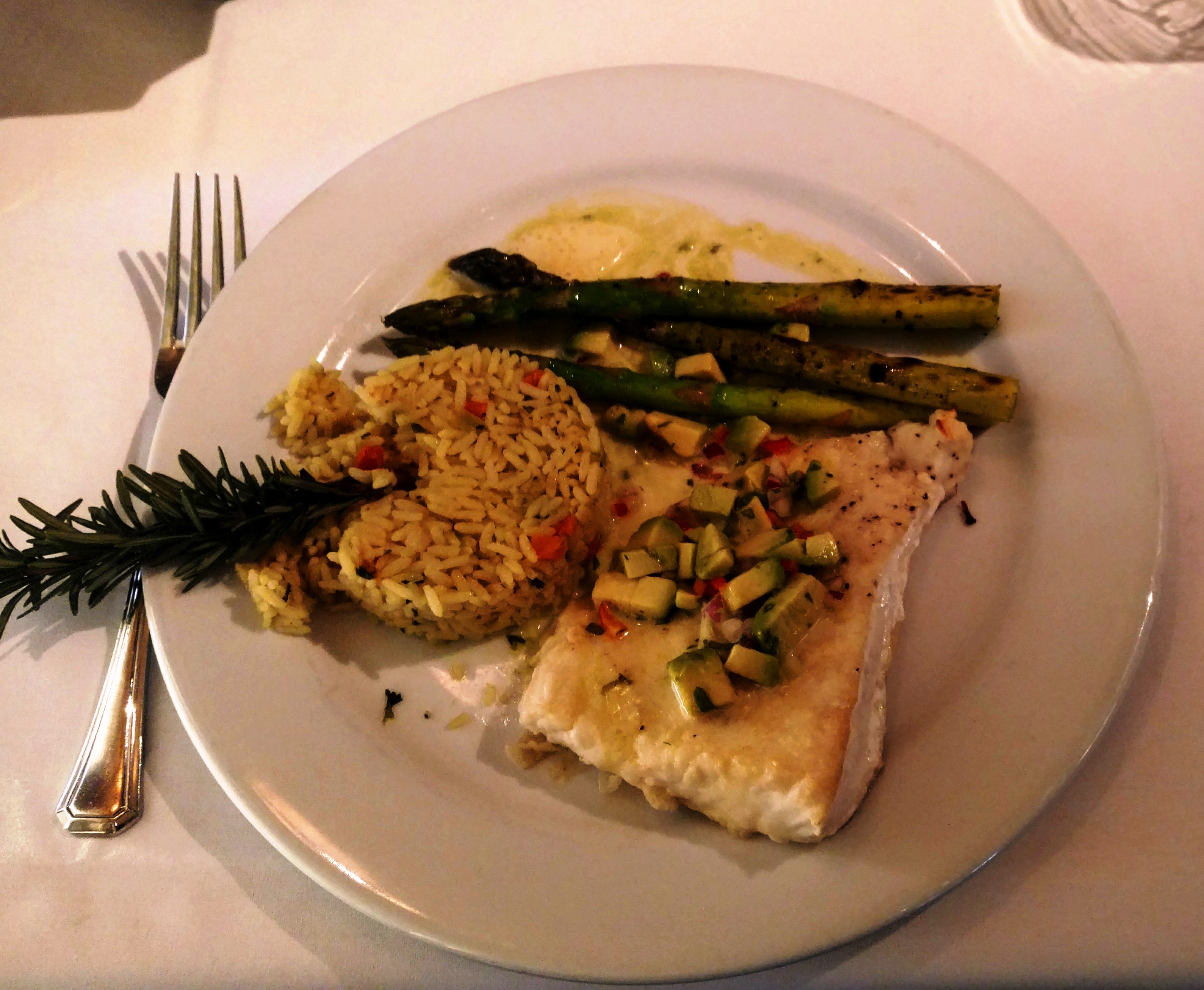 Flakey and tasty Grilled Halibut (L.Compisi)
Flakey and tasty Grilled Halibut (L.Compisi)
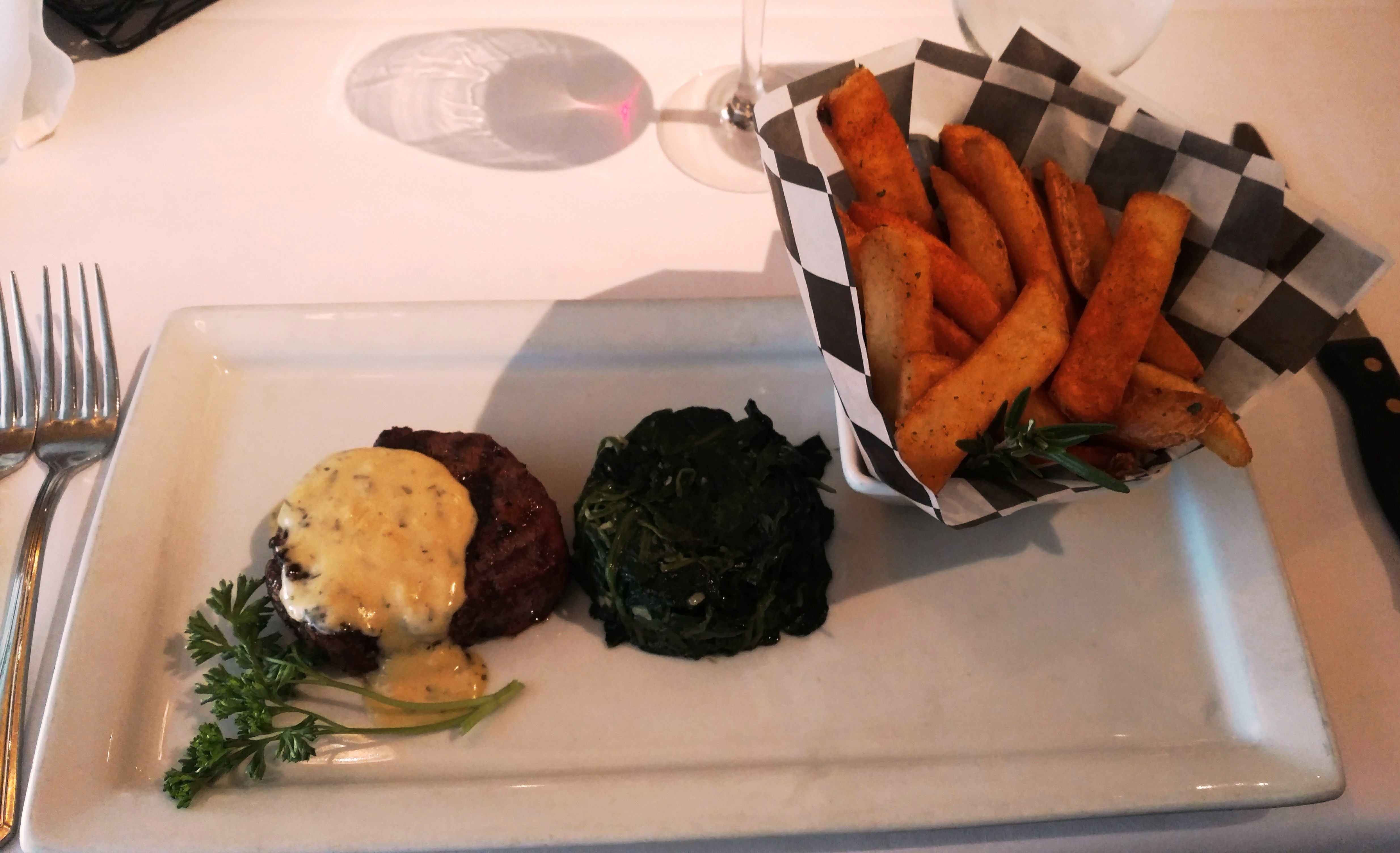 Perfectly prepared Filet with Béarnaise Sauce (L.Compisi)
Perfectly prepared Filet with Béarnaise Sauce (L.Compisi)
Death Valley in Films, on Radio and on Television: At least 24 films, with the 1970 “Zabriskie Point” being perhaps the most well-known, used Death Valley as their venue or were filmed there. “Death Valley Days” was both a radio series from 1930-1945 and a TV series from 1950-1972.
Getting there: We flew United Airlines from Sonoma County’s Charles M. Schulz Airport (STS) via San Francisco (SFO) to Las Vegas (LAS). The 1st leg was about 20 minutes and the 2nd just over an hour and 15 minutes. Very relaxing and the $10 per day parking at STS was very reasonable.